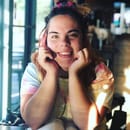When scrolling through Twitter the other day, I came across this tweet that expressed how disappointing it was that they could not even get into an “accessible” bathroom stall. It also mentioned how humiliating it can be for those with disabilities who are not able to have their access needs met (Cavanaugh, 2020). After reading this tweet, I sat back and thought to myself about all of the times that either I or someone that I know has experienced this exact same thing. When walking into a store or a restaurant people with disabilities always have to look for access points and areas of the store or restaurant where they are able to get through. Able-bodied people have the ability to step over or around the obstacle that is in their way. Now, this is not to say that all disabilities are the same in each person’s view of how accessible something is can be different. If the person can walk using assistance than the store is more accessible to them as it is for someone who is in a wheelchair and may not have the ability to maneuver around the obstacle that is in their way. Most of us have no problem asking a sales associate to help us remove the obstacles that is in our way, but at the same time, it can be difficult for us to ask for help because while trying to work on our independence, we are constantly having to ask for things to be moved or to be grabbed or put away. Independence up for anybody is an important milestone, but for those with disabilities it is life altering.
By the time a child is one or two years old, they are able to walk, talk, grab things and put things away. When a child has a disability, most of those significant milestones are delayed, or simply not achievable at that point in time. Having parents help their children at these young stages are mandatory and expected, but as they grow older, their personality starts to shine through and they are slowly given the task to achieve the life skills on their own because their body starts to work with them and not against them. Children who have physical disabilities such as me are being constantly betrayed by their bodies, our mind tells us to do one thing, but it does another, or simply doesn’t complete the action at all. When growing up and attending grade school, the teachers knew about my disability and accepted it, but they really did not do anything to make me feel included. Because I was isolated a lot of the time, I felt that I did not have the same access to the educational experience that my friends were having. When trying to participate in recess and PE, I was often left to sit on the sidelines because the activity they were doing for that day was not made accessible for me, and therefore a school that claimed to be accessible was not accessible at all. The term accessible does not just mean having a couple of grants put in or having bars in the bathroom stall, accessible means that everything that is offered to one child is offered to all children regardless of ability.
Parents of children with disabilities sometimes have to go through this vicious cycle of paperwork, meetings, more paperwork, phone tag and then they finally get to meet with someone who will not accept their request for things such as physical therapy, occupational therapy, speech therapy and many other things that a child would need to be successful just because they have to jump through some more hoops to get it done. The world has gotten a lot better with accepting disability now than they ever have before, but that is still not enough. A parent of a child with a disability is only looking for what any other parent would look for when you take your child out in public, normalcy. A lot of times, parents of a child with a disability who take their child out in public often receive stairs and unforgiving looks. When other children come up to the child and start asking questions, the parent will often shush them and pull them away without a second glance. It is understandable that the other parent would not want to “offend” the parents of the child with a disability, but by pulling the child the way and not allowing them to engage with the child with a disability, all that parent is doing is making that child feel isolated and unaccepted in this already complicated world. Therefore, something as simple as social interaction is no longer accessible to the child.
Most businesses nowadays are required to be compliant with the Americans With Disabilities Act (ADA), but many of these businesses will only keep up with the bare minimum, therefore it is still not accessible. Putting a ramp at your front door does not make your business accessible just as putting bars in a bathroom stall does not make it accessible. I cannot count the amount of times where I have gone into the bathroom and have seen an “accessible” stall. There were bars in the stall, but in no way was it big enough for my chair to the inside. After each of these experiences I can’t help but feel so embarrassed and sad. Using the restroom is a basic human need that I could not even complete by myself because the restroom was not accessible to me. Businesses that claim to be accessible and only comply with the bare minimum because they choose to, not because they can’t afford it or because of the age of the building, but because they simply do not want to are doing a disservice to everyone not just those in the disabled community. Those who do not even try to make their business accessible or only comply with the bare minimum are setting an example that shows that we do not need to have equal access for all. These businesses may be unknowingly making a statement and that people in a minority mean less than the majority.
It is understandable that some places cannot be made 100% accessible and that is fine, but when locations claim to be accessible and it is obvious that they are not, that is when it becomes an issue. There are so many times in life when I have brought up an issue with accessibility to a person in charge, and they are just not wanting to listen to me. They are not even willing to take my suggestion for my comment to mind and try to think of an accessible solution. Some people are not willing to look at others who have a disability as their equal, and then they go and complain about how something is not accessible to them, but when people with limitations simply ask others to help them find a solution to the issue, they are not listened to. Those of us with disabilities are not asking able-bodied people to drop what they’re doing and make everything accessible because that is what they deserve. We are simply asking if there is a way to collaborate and think of a solution together. We want to know that we are heard and that others would be willing to put in the same effort that we strive to put in every day.



